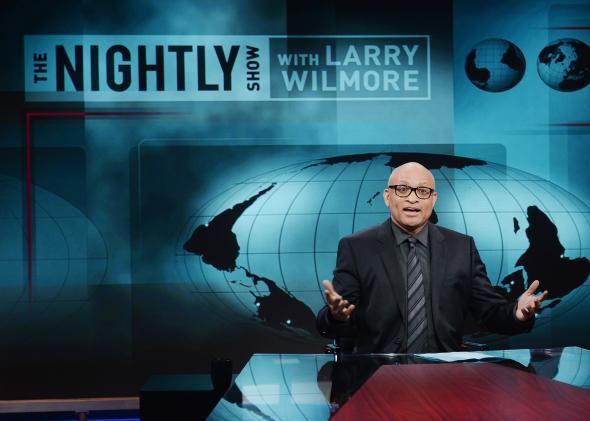One week in, The Nightly Show, the new Comedy Central news series hosted by Larry Wilmore, feels both necessary and obvious—a fix for the enormous hole in the roof that’s been leaking into your living room for years and years. Wilmore, the longtime “Senior Black Correspondent” on The Daily Show, took over Stephen Colbert’s time slot on Monday night, seated in front of a map of the world turned upside down. Each episode of The Nightly Show has a theme: the state of black protest, Bill Cosby, Obama’s State of the Union, and Cuba filled out the opening week. Wilmore begins with a Daily Show/Colbert Report-style comedic monologue on the central subject, before segueing into a Politically Incorrect-style panel discussion on the same topic, with guests like (so far) Cory Booker, Talib Kweli, David Remnick, plus a handful of comedians to keep things punchy. The panelists then stick around to participate in the show’s final segment “Keep It 100”— as in “keep it 100 percent real.” Wilmore asks them to truthfully answer a tough question, or otherwise be showered in “weak tea,” a highly entertaining exchange that bears some resemblance to “Plead the Fifth,” a recurring bit on Andy Cohen’s Watch What Happens Live.
As a host, Wilmore positions himself as a straight talker. Keeping it 100 is the goal of every part of every episode. Wilmore says exactly what he means, wringing humor not so much from jokes as from honesty. Monologuing about Bill Cosby, Wilmore concluded: “That motherfucker did it!” Speaking about the State of the Union, Wilmore’s take away was that Obama “doesn’t give a fuck.” Though stated with rare force, these positions are not in and of themselves unique. (The assertion that Obama has no more fucks to give was a widespread Twitter consensus on Tuesday night, 24 hours before The Nightly Show aired its take.) And yet there has previously been no black perspective on late night to take these subjects on with such matter-of-fact vigor.
The panel discussions have been rowdier and more rambunctious than the monologues, which will have to get more intricate with time. The four panelists, a mix of writers and comedians, tend to include one dissident—a Cosby defender, an Obama hater—that leads to the beginnings of spirited conversation. Wilmore is more at ease here than he is behind the desk, adept at staying funny and including everyone. If the opening bits can feel a little one-note, the panels are brimming with substantive conversations there’s not quite time enough to have, follow up questions that can’t be asked.
The panelists stick around to “Keep It 100,” a deliciously naughty segment. Wilmore’s questions have been good and tough, appealingly troublemaking. “Do you want to be president?” he asked Booker. Booker prevaricated, and ended up with some weak tea. Wilmore asked the comedian Godfrey if, before the election, he saw Obama murder someone, would he still have voted for the black guy? Godfrey would have. “Keep It 100” makes for a lively bit of theater: It’s fun to watch public figures make instant calculations about what they should or should not say, whether or not they come to overly cautious conclusions.
But what distinguishes The Nightly Show from other late-night shows, of course, is not any particular segment, but its combination of subject matter and host—a black man hosting a late-night show dedicated, largely, to race. Both series devoted to racial themes and series hosted by black men are rare, especially on late night. This rareness is evident in how fresh The Nightly Show can feel, despite being extremely straightforward: It doesn’t have, or need, any gimmicks. Talking about race on television under the supervision of a black man is gimmick enough.
